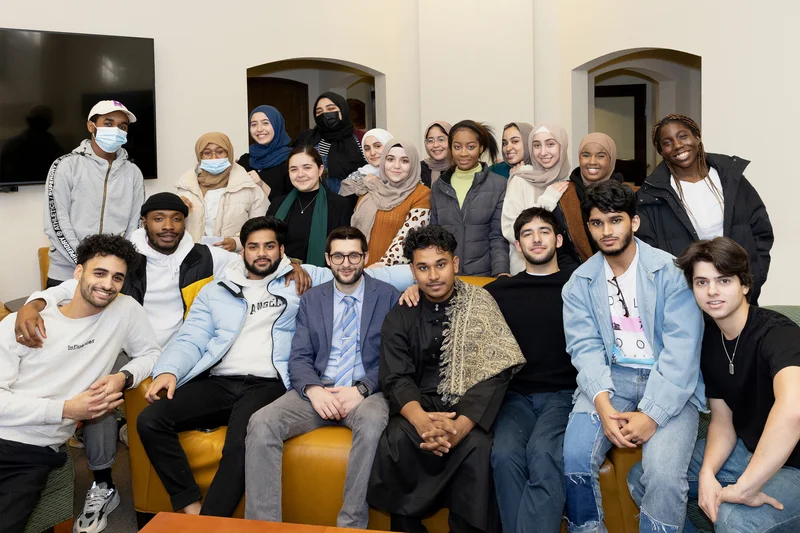Building Community and Understanding
Syracuse University Muslim chaplain and doctoral student takes the lead on improving the Muslim student experience in higher education.

Amir Durić, Imam for the Syracuse Muslim community, focusses his doctoral research on the impact that accommodations such as flexible space and scheduling for daily worship have on Muslim student success.
On a recent Friday afternoon, while a brisk wind blew snow sideways across the nearly empty Quad, the halls of Hendricks Chapel rang with conversation and laughter. Jumuah prayers, the main weekly service for Syracuse University’s Muslim community, had just ended. Some students lingered in the main chapel; others trooped downstairs to enjoy warming beverages from People’s Place Cafe.
This community spirit is representative of the culture fostered by the University’s Muslim chaplain and Imam, Amir Durić. Since joining the Syracuse community in 2017, Durić has spearheaded initiatives to support and build community for Muslim students. And, through his groundbreaking research on Muslim student experiences in higher education, Durić’s work is poised to be transformational well beyond Syracuse University.
My approach to education has always been that it helps me understand my purpose and helps me envision how I can use what I know and what I have learned to help those around me.
—Chaplain Amir Durić
Student-Centered Research
Durić believes that students thrive when they are acknowledged, accepted and supported for who they are. “God created us each in the most perfect shape, in the most perfect image. So, the more you feel comfortable and confident to be who you are, the more you can accomplish,” he explains. This perspective underlies Durić’s efforts to ensure support and understanding for Muslim students, who contend with specific challenges in the practice of their faith. For example, observance of the five daily prayers—which occur at times determined by the movement of the sun—can lead to schedule conflicts with other requirements and opportunities.

Muslim students, faculty and staff gather in the main chapel of Hendricks Chapel on Friday afternoons for weekly communal prayer.
But when Durić started his work as the University chaplain, he realized there was dearth of research on the experiences of Muslims in higher education. There was very little data about how accommodations addressing the needs of practicing Muslim students affected their academic and extracurricular engagement. Without data, it was difficult to establish benchmarks or construe a path forward.
Looking for a way to build that body of knowledge, Durić discovered the interdisciplinary social science doctoral program offered by the Maxwell School of Citizenship and Public Affairs. The self-directed and flexible program has allowed him to combine study of spirituality, counseling, education and administrative leadership, and explore the work he has long known as a practitioner as a source of quantitative and qualitative data.
Like all other students, Muslim students are at universities to seek knowledge and grow to their potential. If we do our part to meet their needs, we are setting them up for success. They’ll be able to be who they are and be the best version of themselves.
—Chaplain Amir Durić
“My approach to education has always been that it helps me understand my purpose and helps me envision how I can use what I know and what I have learned to help those around me,” Durić says. His research informs his collaborations with partners around the University to ensure Muslim students are not disadvantaged by the practice of their faith. And he hopes it will also provide insight to other chaplains, administrators and campus partners looking to accommodate the Islamic community on their campuses. “Like all other students, Muslim students are at universities to seek knowledge and grow to their potential,” Durić says. “If we do our part to meet their needs, we are setting them up for success. They’ll be able to be who they are and be the best version of themselves.”

Durić has spearheaded initiatives that bolster a sense of belonging and community among Muslim students on campus.
Answering the Community’s Call
Durić grew up in a small town in Bosnia and traces his interest in leadership and community service to the morning calls to prayer that his grandfather encouraged him to do for the neighborhood. The experience was rewarding, and at a young age Durić decided he wanted to become an Imam. “Even as a child, I recognized that it meant more than leading prayers—that an Imam carried the responsibility and the honor of being a leader and model for the community,” Durić says.

Syracuse University has long been a leader in its support for Muslim students, Durić says, making accommodations that welcome and support a wide diversity of worship traditions.
Just out of college and newly married, Durić and his wife moved to the United States in 2010. Durić served as an Imam for a community of Bosnians in New Jersey and volunteered in hospitals and prisons. He earned a master’s degree and his chaplaincy from Hartford International University for Religion and Peace, where he focused particularly on gaining an understanding of Islam in the U.S. and Christian-Muslim relations.
When Syracuse University reached out to Durić, he was drawn to the opportunity to work at a university that offered young people unprecedented opportunities to take on leadership roles, build on their creativity, chase dreams, and question and explore. “I realized that at Syracuse University I would be able to contribute and also to grow,” he says.
Leading By Example
Syracuse University has long been a leader in its support for Muslim students, Durić says. Among the accommodations secured most recently are more Halal options in the dining centers, spaces in dormitories and Bird Library that can be used for religious observance, renovation of the Muslim prayer room in Hendricks Chapel, and the replacement of six rows of pews in the main chapel with chairs, which can be removed to create more open space. This allows the main chapel to better support a variety of worship styles, including Muslim prayer.
I am most grateful that I’ve been able to observe the potential of so many young people come to fruition.
—Chaplain Amir Durić
Durić says that over the past several years he has seen a near doubling of attendance at weekly prayers and Muslim Student Life programming, as well as greater Muslim student engagement in the broader campus community. He counts the Understanding Islam series, launched in 2018, as one of the most rewarding developments. The series invited non-Muslims and Muslims—among whom there is tremendous ethnic and cultural diversity—together to discuss Islam, ask questions and engage in open dialogue. Durić imagined the series would run for just one semester, but interest has been so high that it was extended semester after semester and may evolve into a certificate program. “Some really beautiful and meaningful discussions happened, and the series became a platform where non-Muslims and Muslims were truly learning from one another,” Durić explains.
Reflecting on what he characterizes as his unlikely journey to Syracuse, Durić emphasizes the gratitude he feels to be contributing to its tradition of student support. “Being University chaplain is one of the biggest blessings that happened to me. It has made me better through observation, through listening to others, through my own learning,” he says. “And I am most grateful that I’ve been able to observe the potential of so many young people come to fruition. I am thankful to God every day for that honor.”
Sarah H. Griffin
This story was published on March 21, 2022.
For more info, Click Here.


